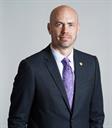
Scott C. Nelson, DPM, FACFAS
ACFAS President
I started this year off with the mindset that this was going to be a race, not necessarily a marathon, but more like a 400-meter dash. Little did I know right out of the blocks, I would have the ‘Usain Bolt’-type competitor named COVID-19 setting the pace. It seems to have kicked us off at a quicker pace, however nothing too uncomfortable.
Having personal experience running several 400-meter races, I feel as though I’m hitting the 200-meter point of the race as I reach the halfway point in my presidential year. When hitting this point, it is easy to have a mental lapse and “let-up” but instead you need to “re-up” your mental focus—it’s the time when you have to reinvest and refocus your energies to cross the goal in good form.
Way too often, kids are forced to run the 400-meter dash at a track meet without any knowledge of how to run it effectively. Often, they are thrown in and told to run as fast as they can for as long as they can, which ultimately sets them up for failure. A simple strategic discussion on how to go about running the race can make all the difference and a more enjoyable experience.
We can help our profession in a similar way by serving as mentors to our students, residents and fellows. As an established practitioner, you can serve a valuable role in shaping the life of a young member and have the potential to be immortalized in the eyes of someone by serving as a life educator. The “youth” of the profession just completed some of the most challenging portions of their careers and are uncertain of the next step. ACFAS members can offer tremendous insight on their next steps to help ensure a successful career in foot and ankle surgery. However, the difficulty lies in how to reach out. Fortunately, we have options through our ACFAS student chapters. To give some perspective, contact a student club near you by visiting the Student Center page on acfas.org.
Common questions from young members are, ‘What should I look for in a residency program?’ and ‘Should I do a fellowship program?’. You may be able to give insight into how to select a residency program, including surgical caseload, the variety of case types and rotations available for general medicine and surgery training. As a third and fourth year, there is limited access to this knowledge, and they need assistance to make an educated decision on rotations and application for residency programs. Your honest perspective can be another educational tool in their decision for their immediate future.
Also, there can be confusion on board qualification and board certification for residents in their last year, then add in the challenges for hospital privileging and getting on insurance plans—it can all get overwhelming. As practicing foot and ankle surgeons, it makes sense to emphasize the importance of obtaining certification from the American Board of Foot and Ankle Surgery (ABFAS). It can be a watershed moment for those looking to use their multitude of procedures they learned in residency and without this crucial step, these new graduates will have difficulty pursuing hospital privileges. Any guidance you can give them in this process can help prevent needless duplication of efforts and still ensure a full cache of procedure options.
The importance of reinvestment cannot be overstated; we all have something to offer the future of our profession and taking time to do so can leave a lasting impression on so many. You may also be at a point in your career where you are looking to mentally reinvest yourself into your practice. Fortunately, this is where WE can help YOU! Keep looking out for your educational offerings as travel and meeting return to baseline.
